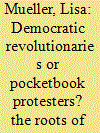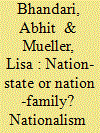| Srl | Item |
| 1 |
ID:
120984


|
|
|
|
|
| Publication |
2013.
|
| Summary/Abstract |
This article investigates whether political or economic grievances were the main driver of the mass demonstrations in Niger in 2009-10, which occurred at a time of famine and the President's attempt to defy the constitution and seek a third term in office. Using original survey data from a quasi-random sample of Niamey residents, the article shows that low prospects of upward mobility are associated with a higher likelihood of protest participation, whereas opposition to the President's anti-constitutional politics is not. Membership in civic organizations is also associated with higher protest participation, but not because these groups are effective at framing the issues: what matters is the capacity of organizations to mobilize individuals. This suggests that civil society may have a galvanizing effect on citizens, even if efforts to win hearts and minds fail. The article concludes that the uprisings were driven mainly by economic grievances, thus contradicting international perceptions of the protests as a public outcry for democracy and casting doubt on the motivations behind supposedly pro-democracy movements, especially in contexts where autocracy and poverty coincide.
|
|
|
|
|
|
|
|
|
|
|
|
|
|
|
|
| 2 |
ID:
167530


|
|
|
|
|
| Summary/Abstract |
Scholars have long puzzled over strong nationalism in weak African states. Existing theories suggest that (a) incumbent leaders use nationalistic appeals to distract people from state weakness; or (b) citizens use nationalistic claims to exclude rival groups from accessing patronage and public goods. But what explains robust nationalism in places where politicians seldom visit and where the state under-provides resources, as is true across much of Africa? We propose a theory of familial nationalism, arguing that people profess attachment to a nation-family instead of to a nation-state under conditions where the family, and not the state, is the main lifeline. We substantiate it using surveys from the border between Niger and Burkina Faso, where an international court ruling allowed people to choose their citizenship, thus providing a test for nationalism in marginalised communities. We supplement the border data with surveys and focus groups from the capitals of both countries.
|
|
|
|
|
|
|
|
|
|
|
|
|
|
|
|